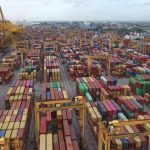Rates for shipping containers from east Asia and China to the US surged this week as importers pulled volumes forward ahead of the possible restart of the US Gulf and East Coast port strike and anticipated tariff hikes under the incoming Trump Administration.
Rates from Asia to both US coasts had been trending steadily lower since July.
Rates from Shanghai to New York began stabilizing in October before surging by almost 17% this week, according to data from supply chain advisors Drewry.
Rates from Shanghai to Los Angeles were falling steadily before jumping by almost 26% this week, as shown in the following chart from Drewry.
Drewry has global average rates up by 8% this week, as shown in its World Container Index.
Drewry expects an increase in rates on the transpacific trade in the coming week, driven by front-loading ahead of the looming port strike and possible tariffs.
Rates at online freight shipping marketplace and platform provider Freightos also showed significant increases to both coasts.
Judah Levine, head of research at Freightos, suggested that the pull-forward for the pending strike is largely over as the pre-15 January arrival window has closed.
Levine thinks a strike – or at least a prolonged one – is unlikely now that President-elect Trump has backed the union in the dispute.
But the anticipation of increased tariffs is still driving some unseasonal volume strength, Levine said.
Container ships and costs for shipping containers are relevant to the chemical industry because while most chemicals are liquids and are shipped in tankers, container ships transport polymers, such as polyethylene (PE) and polypropylene (PP), are shipped in pellets.
They also transport liquid chemicals in isotanks.
LIQUID TANKER RATES STABLE
Overall, US chemical tanker freight rates were unchanged this week for most trade lanes ex-USG.
For the USG to ARA, both spot cargoes and contract of affreightment (COA) nominations to northwest Europe took a slight dip this week, with minimal opportunities quoted but remained relatively flat week over week.
COA volumes for January are still pending so it is not clear how much space will be available, but sentiment is that contract business will be strong, making spot space harder to find.
Along the USG to Asia route, there was a bit more activity this week with January base oils, ethanol and vegoil requirements being quoted out in the market.
The January chemical COAs are showing healthy levels, and most regulars are reporting that space is currently tight on paper. Most market participants expect rates to remain steady for the balance of the year.
COA nominations are strong on the USG-Brazil trade lane with still some space available for the end of December. However, several traders were in the market with 10,000 tonnes of caustic soda ex-Point Comfort to Santos for loading on prompt dates.
So far, no fixture has been reported yet, leaving this market overall quiet.
Additionally, ethanol, glycols and caustic soda were seen in the market to various regions.
Source: ICIS,






